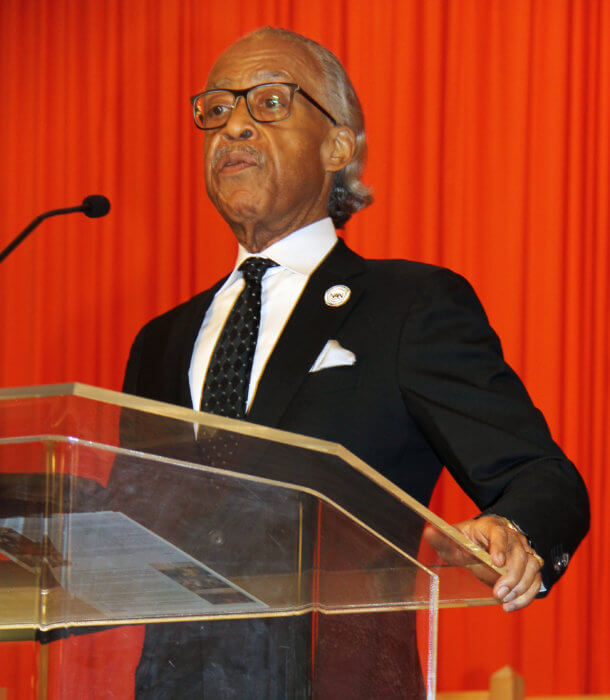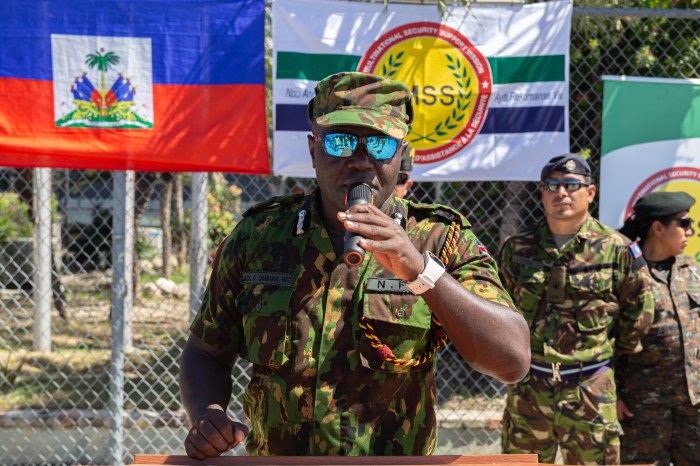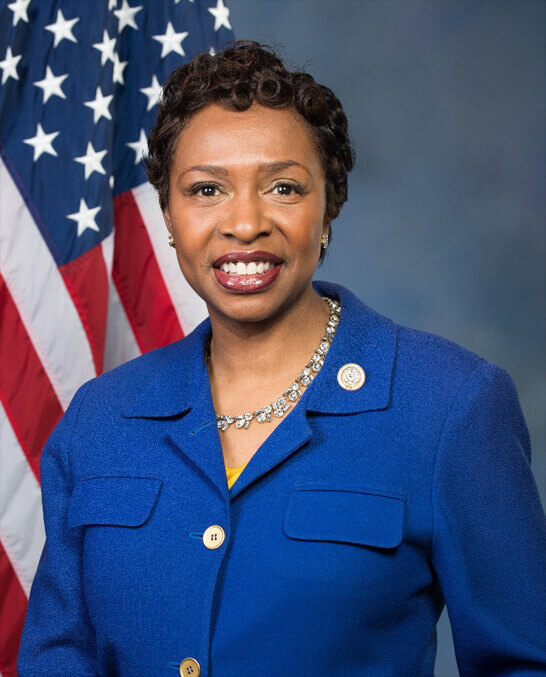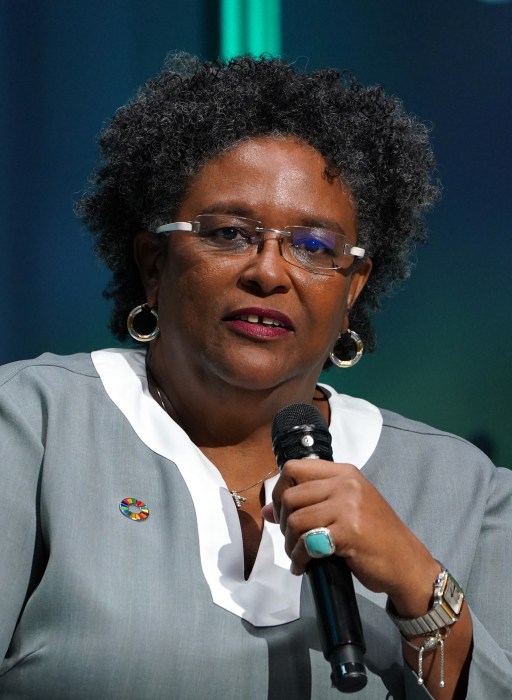New York City Mayor Eric Adams, elected officials and faith leaders last Wednesday called on the federal government to provide more urgent assistance to violence-wracked Haiti.
“It is so important that we deal with the issues in Gaza and deal with the issue in Ukraine and some of the other wars that are playing out on the stage of our globe, but this is in our backyard,” said Adams during a press conference at City Hall with Civil Rights Activist the Rev. Al Sharpton and other faith leaders and legislators. “It’s in our backyard, and many of the residents of Haiti are from New York City, from Miami and from other parts of the Americas.
“It is imperative that we have an immediate response,” he added. “We cannot ignore it and act like it is not taking place. It is traumatizing loved ones and family members who are here in New York City and other parts of the country. We have an obligation to have ATF and other federal agencies investigate the flow of guns that is proliferating on the island.
The US Bureau of Alcohol, Tobacco, Firearms and Explosives (ATF) is responsible for enforcing federal criminal laws and regulating the firearms and explosives industries
“We have an obligation to make sure that we hold any form of deportation of Haitian residents, so they are not sent back, particularly during the time of destabilization that’s taking place now,” the mayor said. “And we have an obligation of giving our expertise how to bring a level of normality to the country at this time.
“The Haitian people are our neighbors. They’re very much part of what is taking place in this hemisphere, and I think it’s imperative that all of us come together, our faith leaders and the organizations that stand behind us as we communicate this issue,” Adams added. “We cannot consider ourselves to be people of faith and watching what is playing out in Haiti at this time, and that’s why we’re coming together to call for an immediate response, not a long‑term, think through the problem.”
The mayor said some of the immediate things that can be done to assist Haiti include stopping the flow of illegal firearms and the deportation of undocumented Haitians; offering expertise on how to stabilize the impoverished, French-speaking country; and providing necessary resources.

Rev. Sharpton, founder and president of the Harlem-based National Action Network (NAN) lamented that the “reign of bedlam and terror” confronting Haiti has not been properly addressed.
“So, we gathered faith leaders that in many ways are the backbone of the Haitian-American community,” he said. “There is no city in this country that has more Haitian Americans that have relatives in Haiti that are living under this threat than in New York City.
“And that is why we wanted to stand with the faith leaders from different denominations and those of us in the African-American community and the Jewish community to say that we’re calling on this country to do all that it can do and more to deal with the crisis in Haiti.
“We have called to the White House and other aspects of the federal government to deal with the crisis in Haiti. There are reports that gun trafficking from Florida is providing arms for the gangs,” he added, stating that there needs to be investigations into this issue.
The Rev. Samuel Nichols, one of the “outstanding” Haitian-American leaders in Brooklyn, said that Haiti is in “a state of anarchy,” calling for immediate help.
“Whatever help that the federal government can do to release the money that is allocated to Haiti so we can have, whether it’s the Kenyans or international forces on the ground, helping to put security in Haiti, this is the primary reason that we are here,” said the senior pastor of the Evangelical Crusade Christian Church in Brooklyn.
“There is bloodshed every single day in Haiti, every single minute; and I assure you, right now as we are speaking, I’m sure that someone is being killed, someone is being slaughtered right now as we’re speaking,” he added. “And we are here today standing with faith leaders asking for the bloodshed in Haiti to stop.
“We are here asking for the country that Haiti helped to build, the Louisiana Purchase, is because of Haitians – because of 1804 that we rose up, the only successful Black revolt that was done. After that, the Louisiana Purchase was done. We helped this country,” Rev. Nichols continued. We helped to build Chicago. So, right here we are asking back here to help.
“Second thing we’re asking, we’re asking for the United States government to help to put back democracy in Haiti,” he said. “Elections need to be done ASAP – as soon as possible – so we can get a country back and running.”
Another prominent Haitian pastor in Brooklyn, the Rev. Mullery Jean‑Pierre, said Haiti urgently needs America’s help.
“We are here standing to let our United States government know that Haiti needs your help now,” said the pastor of Beraca Baptist Church. “We do need an international force going in to help clean up the mess and help dismantle the gangs, and help those gang members who are wearing ties and those who wear suits and those who wear sandals – whichever level of gang members they are – they need to be dismantled in Haiti so that we can have a security.
“We have a police force that needs to be rebuilt,” he added. “We have a military that was reinstated back in 2017, they need to be reinstated. We need to have security in Haiti. We need the Americans to come in, the international force to come in and to bring support, so that we can have free and fair elections.”
Rev. Jean-Pierre also urged that Haitians in the Diaspora “be at the table.”
“It is so important,” he said. “We send remittance to Haiti; we need to be at the table to have a decision in the future of Haiti.
“So, we need help, and we’re asking the government to please step up and do what is right,” he added. “And after they stepped up and done what is right, they need to exit the country and allow the Haitian people to lead their country.”
The Rev. A.R. Bernard, senior pastor at the sprawling Christian Cultural Center on Flatlands Avenue in Brooklyn, also urged the US Government to “intervene against the flow of guns into Haiti.
“And we’re standing together in solidarity to do something, not just offer our prayers,” he said. “I’m very excited about the fact that part of this solidarity today is a representation from the Jewish community. Too often, there’s an accusation that one asks to stand with the other, but in times of our crisis as people of color, they don’t stand. But I’m glad to say that they’re standing with us today.”
Rabbi Joseph Potasnik, executive vice president, New York Board of Rabbis, noted that “when the Bible says you shall love your neighbor, it doesn’t qualify it and say your Christian neighbor or your Jewish neighbor, because all of us are neighbors.
“And as we heard today, the Haitian community certainly is part of the neighborhood,” he said. “One of the most important words we should remember is the word ‘and’; so, matter of fact, when you look at the Jewish Bible – the original Bible – the word ‘and’ connects one part to the other, and that’s who we are today. We’re all in the spirit of ‘and.’ We are connected to each other.
“We come here today with our voices,” Rabbi Potasnik said. “We will not be silent until the people of Haiti can live together in peace.”
Among elected officials who attended the event were Haitian-born Council Members Rita Joseph and Mercedes Narcisse, and Council Member Farah Louis, the daughter of Haitian and Bahamian immigrants.
Narcisse, who represents the 46th Council District in Brooklyn, told Caribbean Life afterwards that America “owes it to the Haitian people, who, in 1804, gave all enslaved people hope for a better day, to assist them in this darkest of times.
“I was happy to stand with Mayor Adams, Rev. Sharpton and a diverse group of faith leaders from across the city to raise awareness to the situation and advocate for help for Haiti,” she said.
Last Thursday, Narcisse and Louis joined a delegation of other prominent Haitian-American leaders, including North Miami Vice Mayor Mary Estimé-Irvin and members of the Miami City Council and faith-based leaders, in travelling to Washington, D.C. advocating for increased US intervention and support to address the ongoing humanitarian crisis in Haiti.
During their visit to the nation’s capital, the Council Members said they engaged in “crucial discussions” with key political figures, including Senate Majority Leader Chuck Schumer, House Democratic Leader Hakeem Jeffries, Sen. Raphael Warnock, Rep. Gregory Meeks, Rep. Yvette Clarke, and other members of the Congressional Black Caucus urging for measures to combat gun trafficking, and bolster humanitarian aid efforts and initiatives for peace in Haiti.
“The Haitian people deserve far better than the severe challenges they are currently facing,” Narcisse said. “Therefore, as a proud immigrant from Haiti, it was deeply personal to advocate for US assistance in providing humanitarian aid to our nation.
“As a close neighbor in the Caribbean, the stability and well-being of Haiti directly impact regional security and the stability of the US,” she added. “I hope the US will immediately unite with the international community to offer well-intentioned support and much-needed resources to help address the deeply rooted causes of this crisis and pave the way for a more promising future for the Haitian people.”
Louis, who represents the 45th Council District in Brooklyn, said: “Our delegation’s efforts underscore the urgency of the crisis in Haiti, and the need for swift and decisive action from the United States government.
“New York City is home to one of the largest Haitian communities outside of Haiti, so the crisis hits close to home for constituents in Central and Southern Brooklyn impacted by the strife abroad, creating humanitarian and logistical challenges for all New Yorkers in my community.”
On Tuesday, the United Nations Children’s Fund (UNICEF) warned that an alarming surge in armed violence in areas of Haiti is heightening the risk of a malnutrition crisis in the country.
Findings from the recent Integrated Food Security Phase Classification (IPC) analysis indicate an alarming 19 per cent increase in the number of children estimated to suffer from severe acute malnutrition in Haiti this year.
UNICEF said around 1.64 million people are facing emergency levels of acute food insecurity, (IPC Phase 4), “which increases the risk of child wasting and malnutrition.”
UNICEF said the ongoing armed violence across Artibonite department and the West department, which encompasses the capital Port-au-Prince, has “restricted aid delivery and severely weakened an already fragile healthcare system, posing an imminent threat to the lives of over 125,000 children at risk.”
“The violence and instability in Haiti have consequences far beyond the risk of the violence itself,” said Catherine Russell, UNICEF executive director.
She added that the situation is creating a child health and nutrition crisis that could cost the lives of countless of children.
“Thousands of children are on the brink, while life-saving supplies are ready to be delivered if violence stops and roads and hospitals are opened. This malnutrition crisis is entirely human made,” Russell said. “Basic security is urgently needed for the people of Haiti, for the life-saving services they rely on, and for humanitarian workers to reach children and families in desperate need.”
Since January, she said the deteriorating security situation has continued to worsen the humanitarian crisis, with serious consequences for UNICEF’s ability to store, deliver and resupply aid.
Despite the highly volatile environment, Russell said UNICEF is doing all it can to protect families and provide life-saving support, including for those who are trapped and cut off from essential services.
The agency is calling for accelerated efforts by the international community to protect civilians, restore law and order and keep humanitarians safe; an immediate flexible funding boost; and protection for schools, hospitals and other key spaces for children.


























